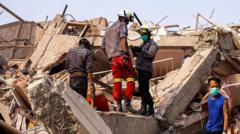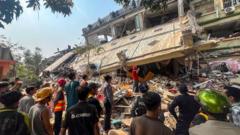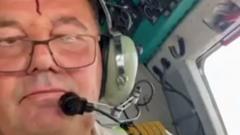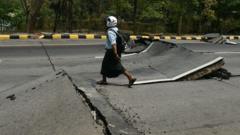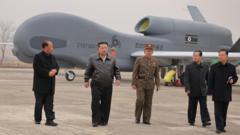The Sudanese military leader, Gen. Abdul Fattah al-Burhan, has announced the full control of Khartoum, following significant military advancements against the paramilitary Rapid Support Forces (RSF). Despite the victory, widespread humanitarian concerns and ongoing violence remain prevalent.
Sudan's Military Claims Full Control of Khartoum Following Strategic Recapturing
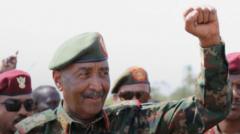
Sudan's Military Claims Full Control of Khartoum Following Strategic Recapturing
Gen. Abdel Fattah al-Burhan visits presidential palace for the first time since war began, declaring capital "free" of paramilitary forces.
Sudan's military leader, Gen. Abdel Fattah al-Burhan, has proclaimed the full control of Khartoum after a significant breakthrough against the paramilitary Rapid Support Forces (RSF). After landing at the city’s international airport, Burhan visited the presidential palace, marking his first appearance there since the onset of the conflict nearly two years ago. Addressing a group of jubilant soldiers, he announced, “Khartoum is free, it's done,” signifying a pivotal moment for the military's governance.
This shift comes as the army has swiftly regained control over various state institutions previously held by the RSF, which had maintained dominance in the capital since early in the conflict. Burhan’s army has effectively secured key infrastructure, including the airport and bridges connecting Greater Khartoum. An army spokesperson indicated that troops had fully reclaimed the airport and aimed to eliminate remaining RSF fighters promptly.
Drone footage has shown movements of individuals crossing bridges, claimed by the military to be RSF fighters fleeing the besieged city. Amidst the turmoil, reports from residents have highlighted a reality of mass looting and occupation by RSF fighters within civilian homes, contributing to deteriorating conditions characterized by near famine levels in Khartoum.
Rights organizations have documented various abuses during the conflict, including allegations of sexual violence and indiscriminate attacks on civilian areas by both warring factions. The situation remains dire, with indications of increased air bombing resulting in civilian casualties.
While the military's recapture of Khartoum could represent a crucial tactical advantage in the prolonged conflict, the RSF continues to exert influence over much of western Sudan's Darfur region. The situation remains precarious as both sides increasingly rely on foreign support, prolonging the quest for peace amidst ongoing violence and humanitarian crises.


